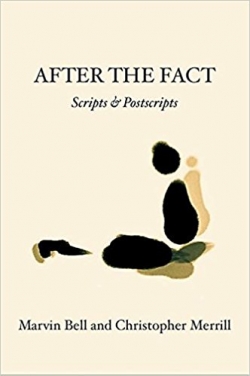After the Fact: Scripts & Postscripts
by Marvin Bell and Christopher Merrill
reviewed by Chard deNiord
Marvin Bell and Christopher Merrill carry on an inspired correspondence in their new collaborative book of prose poems, titled After the Fact: Scripts & Postscripts. As longtime colleagues at the University of Iowa, Bell, the author of over twenty books of poetry and professor emeritus at the Iowa Writers Workshop, and Merrill, the director of the International Writers Workshop at the University of Iowa and author of over eleven books of poetry, assay such subjects as wide-ranging as “the art of the object, Einstein, the apocalypse, radioactivity, William Faulkner, Winston Churchill, Marcel Duchamp, Afghanistan, Tamara Khanum, Samuel Beckett, and 9/11.” But to mention only the subjects of their correspondence hardly does justice to their spare excursuses on huge topics. Here is a random sample—the opening sentences, beginning with Bell, of two heuristic exchanges:
MB:
The ScopeI confess that in my group of three, I am two. Myself watching myself. I admit that, in my writings, the third person, while not me, is someone who knows a lot about me. Thus have I altered the third person pronoun so that he is I and will be I long after the one who here inhabits the I has gone. What am I getting at? It is to suggest that projection and abstraction are ways to transcend the tangible gang war that is contemporary nationalisms. To conjecture that artifice, fancy, illusion, fable and the generalized vision made possible by abstraction are what we use to save ourselves, day after day. …
CM:
TacticsHow we inhabit earth and air, mask and stage, determines what is recorded in the ledger of lost hours: so said the healer who sent us out along the trade routes to spread his teachings, which did attract as many followers as he had hoped. We were surprised to learn that his ideas derived not from divine revelation but from a reference in a history of sea battles dating to antiquity. That we could not grasp the complexity of his thought was for him a source of mirth until we began to take pride in our ignorance. Then he likened us to acrobats on a farewell tour; issued inscrutable decrees—If I is another … If I am inscribed in cloud and stone; upset the delicate balance we had established, at the start of our journey, between the desire to serve some larger purpose and the imperatives of daily life.
As one can see from these pericopes, Bell and Merrill delight in overhearing themselves as they draw on their prodigious knowledge of intellectual history, their own poetic serendipities, and their sheer delight in language. But they are also conversing, engaging in what the theologian Dietrich Bonhoeffer called “hilaritas,” by which he meant “confidence in their own work, a certain boldness and defiance of the world and of popular opinion, a steadfast certainty that what they are doing will benefit the world.” But these call and response paragraphs betray more than just a poetic exercise, manifesting also the creative magic of collaborative friendship. What Seneca wrote about friendship seems true throughout this collection, namely, that “friendship produces between us a partnership in all our interests.” Indeed, myriad interests abound in After the Fact, surprising its two authors as they discover things they didn’t know they knew at each other’s promptings. Journal-like in appearance, each prose poem weds poetry to prose in such a way that neither poet becomes overly self-conscious about form or the line, while at the same time maintaining an engaging poetic compression in which Ezra Pound’s definition of poetry as “the news that stays news” mingles with personal details and the personality of each poet.
Bell undertook a similar project in the early eighties with William Stafford that resulted in a 1983 book, Segues. Bell commented at the time that his back-and-forth with Stafford freed him up to write more expansively, as well as obsessively (he, in fact, defined poetry once as “obsessive views”) by lowering his expectations. From this more spontaneous approach to writing, a serendipitous wisdom emerged emanating from the contagious bonhomie of Bell and Stafford’s correspondence.
Merrill has picked up where Stafford left off, providing a more cosmopolitan scope in which Merrill’s more global subjects—set in such places as Uruguay, Chile, Russia, Afghanistan, Vietnam, and the Congo—force Bell to confront topics outside his usual range. As a devotee of William Carlos Williams’s poetry, Bell has always championed the idea of “the local” in his work, so the geographic distance between Bell’s more fixed locales of Iowa City and Port Townsend and Merrill’s far-flung posts creates an especially exciting reportage of poetic “news stories” in one paragraph after another.
This is a book that one can pick up and start anywhere. There is no specific beginning or end, although there is an engaging flow to the order of the paragraphs in which ideas, historical events, literary figures, and world events concatenate seamlessly, creating both a diachronic and synchronic stream of reflections that betray two minds happily in concert with each other and their musings.
Published on October 10, 2017

